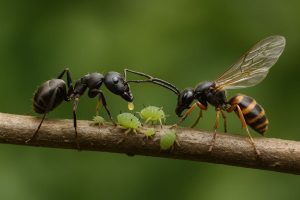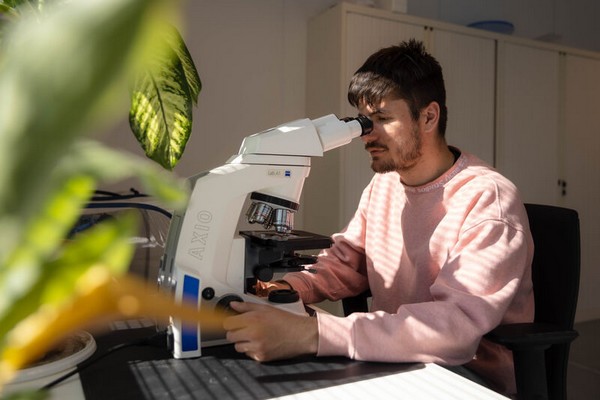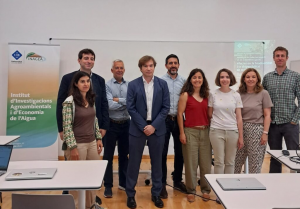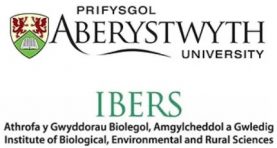
Ants, aphids and parasitoid wasps: An invisible war shaping our ecosystems
Based on Plata, Fernández de Bobadilla & Tena (2025) – Biological Reviews Table of Contents 1. A powerful mutualism: Ants and hemipterans 2. The enemy
María Teresa Fernández de Bobadilla
e-mail: maria.fernandezdebobadilla@gmail.com
CPVB – Entomologia
Institut Valencià d’Investigacions Agràries
Carretera CV-315 km 10,7 – 46113 Moncada
962-931575 – www.ivia.gva.es
Top entomology and plant science`s research institution
The Valencian Institute of Agricultural Research (IVIA), located in the Valencian Community, Spain, is a national and international leader in agricultural research. Founded in 1968, IVIA’s mission is to enhance the competitiveness of the agricultural sector through research, innovation, and technology transfer. Over the years, it has established itself as a pioneering center for scientific knowledge creation, the application of new technologies, and the development of sustainable solutions to the challenges faced by the agricultural sector.
IVIA boasts cutting-edge facilities that enable advanced research and innovations that transform the agricultural sector. The institute is equipped with modern infrastructure, including specialized laboratories, greenhouses, experimental fields, and meteorological stations. These spaces are fitted with state-of-the-art technology for genetic analysis, plant biochemistry, crop protection, and agricultural engineering, allowing researchers to address agricultural challenges with precision.
Among its facilities, the Agricultural Engineering Center stands out, where new agricultural machinery is developed and tested; the Animal Technology Center, focused on genetic improvement and sustainable livestock production; and the Plant Protection and Biotechnology Center, which researches pests, diseases, and new plant varieties using advanced biotechnological techniques. This combination of infrastructure provides a unique environment for high-impact scientific research.
IVIA works across multiple areas of agricultural research, from crop genetic improvement to pest and disease control, as well as optimizing water resources and developing more sustainable agricultural technologies. Its projects cover key areas such as citriculture, the most important crop in the Valencian Community, and horticulture, which includes essential crops like tomatoes, onions, peppers, and other fruit and vegetable products.
One of IVIA’s main focuses is crop genetic improvement, aiming to create varieties that are resistant to diseases and better adapted to changing climatic conditions. Through biotechnology and genetic selection, the institute’s researchers have developed new varieties of citrus fruits and vegetables that not only increase yields but are also more resistant to common pests and diseases.
Another key area is the management of agricultural pests and diseases. IVIA has been instrumental in researching biological control methods, thereby reducing the use of chemical pesticides and promoting more sustainable farming practices. Notable projects include controlling the “cotonet,” a pest that affects citrus fruits, and combating *Xylella fastidiosa*, a bacterium that has caused significant damage to olive and almond crops in Europe.
Additionally, IVIA is actively researching efficient water resource management, a particularly relevant topic in a region like the Valencian Community, which frequently faces drought conditions. The institute has developed precision irrigation technologies that optimize water use, improving agricultural productivity while reducing environmental impact.
IVIA maintains a strong international presence, actively collaborating with research centers, universities, and companies worldwide. These partnerships allow its scientific advances to be applied on a global scale, benefiting farmers and agricultural businesses in multiple countries. Participation in European projects like Horizon 2020 and international research networks has boosted the institute’s visibility and impact on the global scientific landscape.
Moreover, IVIA has hosted major international conferences and symposia where global agricultural challenges and opportunities are discussed. This international projection reinforces its position as a center of excellence in agricultural research, attracting scientists and experts from all over the world.
IVIA’s success would not be possible without its human resources. The institute is staffed by a highly qualified team of researchers, technicians, and specialists from various disciplines who work interdisciplinarily to solve agricultural challenges. This team includes experts in agronomy, biotechnology, entomology, agricultural engineering, and phytopathology, among other fields.
The commitment of IVIA’s personnel to scientific excellence and innovation has enabled the institute to lead numerous advances in the agricultural sector. Through their work in applied research, IVIA’s staff not only generates new knowledge but also facilitates the transfer of advanced agricultural technologies and practices to farmers and industry stakeholders.
IVIA not only generates theoretical knowledge but actively works to transfer these advances to farmers and the business sector. This is achieved through training programs, technical workshops, and scientific publications that bring research into practical application. The implementation of solutions developed by IVIA has contributed to improving the profitability and sustainability of the agricultural sector in the Valencian Community and beyond.
In conclusion, the Valencian Institute of Agricultural Research has established itself as a reference center in the field of agricultural research. With cutting-edge facilities, a highly qualified team, strong international projection, and a commitment to sustainable innovation, IVIA continues to drive agricultural science toward a more productive and sustainable future.
World`s best city to live according to InterNations
Valencia, Spain’s third-largest city, is a destination that perfectly combines tradition, modernity, culture, and nature. Located on the country’s eastern coast along the Mediterranean Sea, Valencia is known for its vibrant cultural life, exquisite cuisine, and historical monuments. The city has also become one of the most attractive tourist destinations in Spain, thanks to its mild climate, diverse leisure and entertainment options, and its rich artistic and architectural heritage.
Among all of Valencia’s festivals, Las Fallas are undoubtedly the most representative and globally famous event. Held in March, these popular celebrations attract thousands of tourists from around the world. Las Fallas are a burst of light, color, and sound that fill the city for several days. During the festival, enormous cardboard sculptures known as “ninots” are created, satirizing politicians, celebrities, and societal figures. These impressive works of art are burned on the final night, called the “Cremà”, on March 19th, in a spectacular finale symbolizing renewal and purification.
The festival also features traditional parades, concerts, fireworks, and the famous Offering of Flowers to the Virgin of the Forsaken, Valencia’s patron saint. It is a celebration where the music of local bands and the smell of gunpowder fill the air, showcasing the most festive and passionate side of the city.
Valencia boasts an impressive architectural legacy that spans from Roman times to modernity. One of its most iconic monuments is La Lonja de la Seda (The Silk Exchange), a UNESCO World Heritage Site. This majestic Gothic building, which once served as the hub of silk trade, symbolizes the city’s commercial prosperity during the 15th century. Its grand columned hall and imposing tower are must-sees for history and architecture lovers.
Another highlight is the Valencia Cathedral, home to the Holy Chalice, which some believe to be the true Holy Grail. The cathedral combines several architectural styles, including Gothic, Renaissance, and Baroque, and its famous bell tower, El Miguelete, offers stunning panoramic views of the city.
The Palacio del Marqués de Dos Aguas, with its impressive Baroque facade, and the Torres de Serranos and Torres de Quart, once part of the city’s medieval walls, are other notable landmarks to visit.
If there’s one place that has redefined Valencia’s skyline, it is undoubtedly the City of Arts and Sciences. This futuristic architectural complex, designed by Santiago Calatrava, is one of the city’s most important tourist attractions. It includes several buildings such as the Hemisfèric, the Príncipe Felipe Science Museum, the Oceanogràfic, and the Palau de les Arts Reina Sofía.
The Oceanogràfic, in particular, is the largest aquarium in Europe, housing an incredible variety of marine species from oceans around the world. It is an ideal spot for families and nature lovers, where visitors can learn about marine biodiversity in an interactive and fun way.
Leisure, Culture, and Gastronomy
Valencia offers a wide range of cultural and entertainment options. The Barrio del Carmen, in the old town, is famous for its lively nightlife, with a great selection of bars, restaurants, and venues where you can enjoy the Mediterranean atmosphere. The city also boasts an interesting array of museums, such as the Museum of Fine Arts of Valencia, which houses an extensive collection of works by artists like Goya, El Greco, and Sorolla.
One of Valencia’s great attractions is its gastronomy. No visit to the city is complete without trying an authentic paella valenciana, a traditional dish made with rice, chicken, rabbit, and vegetables. Tourists can also enjoy a rich selection of tapas and Mediterranean dishes at local markets, such as the Central Market, one of the oldest markets in Europe.
Beaches and Nature
Valencia is also an ideal destination for sea and nature lovers. Its expansive beaches, such as Malvarrosa Beach and Las Arenas Beach, offer the perfect setting to relax under the sun or practice water sports like windsurfing or sailing. The seafront promenade, lined with beach bars and restaurants, is the perfect spot to enjoy a sunset dinner by the sea.
A few kilometers from the city center lies the Albufera Natural Park, a natural paradise where visitors can take a boat ride on its calm waters and observe local wildlife, especially birds. This wetland is also where the rice used to make paella is grown, making Albufera a place of great cultural and natural significance.
Valencia is a city that knows how to blend its rich historical heritage with a modern and innovative spirit. Its traditional festivals, cultural offerings, and proximity to the sea make it a unique destination for all types of travelers. Whether you want to immerse yourself in its traditions, enjoy its lively urban life, or relax on its beaches and natural spaces, Valencia always has something special to offer.
Sunny, warm, spanish culture, gastronomy and life quality
The Mediterranean culture is a true treasure of the Mediterranean basin, renowned for its high quality of life, rich gastronomy, privileged climate, and deep connection to nature and leisure. Spain, and particularly the city of Valencia, embody this Mediterranean essence at its finest. Here, visitors can immerse themselves in a relaxed and vibrant lifestyle, where tradition and modernity blend seamlessly, and the sea is always a constant backdrop. From the Mediterranean diet, famous worldwide, to its sunny climate, coastal landscapes, and vast green spaces, Valencia is the ideal destination for those seeking an authentic experience.
The Mediterranean lifestyle is synonymous with balance, well-being, and the enjoyment of life’s small pleasures. Spain, and especially the region of the Valencian Community, offers an unparalleled quality of life that has attracted both locals and tourists from all over the world. The combination of a warm and sunny climate for most of the year, outdoor living, and a strong sense of community makes life in the Mediterranean unique.
Valencia, with its focus on community life, its vast public spaces, and its relaxed pace of life, is a clear example of this. Time seems to slow down here, allowing its residents to enjoy outdoor activities, the terraces of bars and restaurants, and the cultural events that enliven the city. The concept of the “good life” is palpable: family time, social gatherings, and the enjoyment of nature are prioritized, all within a modern and well-connected urban environment.
One of the highlights of Mediterranean culture is its rich and varied gastronomy. The Mediterranean diet, declared an Intangible Cultural Heritage by UNESCO, is based on fresh, local ingredients such as olive oil, fruits and vegetables, legumes, fish, and, of course, rice, which plays a central role in Valencian cuisine. This balance of fresh ingredients and authentic flavors not only delights the palate but also contributes to health and well-being.
In Valencia, the undisputed star of the culinary scene is paella, a traditional rice dish cooked with chicken, rabbit, green beans, and other vegetables. While there are many variations, paella valenciana remains the most representative. Valencia is also famous for other rice dishes such as arroz a banda and arroz negro, and for its wide variety of fish and seafood, reflecting the influence of the sea on its cuisine.
For those with a sweet tooth, horchata is a must-try: a refreshing drink made from tiger nuts, traditionally served with fartons. Valencia is also a paradise for tapas lovers, with bars and restaurants throughout the city offering both traditional and innovative options.
The Mediterranean climate is one of the region’s main attractions. With mild winters and warm summers, Valencia enjoys over 300 days of sunshine a year, allowing residents and tourists to enjoy outdoor activities year-round. The pleasant temperatures make it an ideal destination for strolling through its streets, visiting its monuments, and enjoying its beaches even outside the peak summer season.
The sea breeze cools the air on the hottest days, and the warm evenings invite you to enjoy the terraces and outdoor events that abound in the city. This climate also fosters an active and healthy lifestyle, where outdoor sports and recreational activities such as cycling, swimming, or hiking are part of the daily routine.
One of the most important natural features of Valencia is the Turia River, which was diverted after the great flood of 1957 to prevent future floods. The former riverbed has been transformed into an extensive urban park known as the Turia Gardens, which runs through the city and is one of the largest parks in Spain. This green lung stretches for over 9 kilometers and offers a multitude of leisure and sports activities in the open air.
The Turia Gardens are ideal for walking, cycling, or simply relaxing in its numerous grassy areas, surrounded by a wide variety of Mediterranean plants and trees. Along the way, visitors can find landmarks such as the City of Arts and Sciences, the Gulliver Park —a children’s park shaped like a giant— and the Palau de la Música. It’s also a space where cultural and sports events are held throughout the year, making it a dynamic and lively place.
Valencia is not only known for its coastline but also for the numerous green spaces that dot the city and its surroundings. In addition to the Turia Gardens, the Parque de Cabecera, located at the western end of the riverbed, offers expansive areas of greenery and a lake where visitors can enjoy boat rides.
In terms of nature beyond the city limits, the surroundings of Valencia are a paradise for outdoor enthusiasts. Just a few kilometers away is the Sierra Calderona Natural Park, a mountain range perfect for hiking, mountain biking, and observing native wildlife and flora. Another highlight is the Sierra de Espadán Natural Park, a Mediterranean forest reserve with hiking trails that showcase the beauty of the mountains and natural springs.
Valencia is a top destination for those looking to enjoy the sea. Its urban beaches, such as Malvarrosa and Las Arenas, are ideal for relaxing under the sun or engaging in water sports like windsurfing, sailing, or paddleboarding. The proximity to the port also allows visitors to enjoy boat trips along the coast or gastronomic experiences in seaside restaurants.
Just a few kilometers away is the Albufera Natural Park, a unique space where Spain’s largest freshwater lake meets the sea. It’s the perfect place to observe birds, take boat rides, and enjoy the tranquility of nature.
The Mediterranean culture in Valencia offers an unmatched way of life, where the good climate, nature, gastronomy, and leisure combine to create the perfect destination for all types of travelers. Whether you want to explore its beaches, stroll through its parks and gardens, or discover the richness of its cultural and natural heritage, Valencia is the ideal place to experience the true essence of the Mediterranean.

Research Associate at Koppert Biological Systems

Postdoctoral researcher at Universität Zürich

Manager in Yurabiosearch
I worked together with Maite during her time as a PhD student in Wageningen in 2019, where she supervised me during my Masters thesis. What I remember most of Maite, were her everlasting enthusiasm in her field, her kind-hearted character and her expertise in insect-plant interactions. Maite was always very helpful and I couldn’t have asked for a better supervisor than her. She gives excellent feedback, triggers independently thinking of students by asking the right questions, and guided me through the thesis by both making sure I learned the most and to get high quality results. I will never forget my time with Maite and I am forever grateful to her, she was a big inspiration for my career!
I had the pleasure of being supervised by Maite during my MSc, and it was a key point in my academic path. Her guidance goes beyond sharing her expertise in insect-plant interactions. Maite knows how to identify and develop her students' strengths. She encouraged me to apply for a PhD, which I might not have considered without her support. Her blend of scientific knowledge, straightforward advice, and passion for research made my time working with her as a student, but also as a colleague both productive and motivating. Anyone considering joining Maite’s team in Valencia will find a mentor who is committed to helping her students grow both academically and personally.
Maite was my thesis supervisor when I was finishing my master program. Her support, guidance and feedback were incredibly valuable throughout the process. The ease with which she conveys his knowledge, her openness to listening and discussing new ideas and the charm of his personality, made me deliver the best in my project.

Based on Plata, Fernández de Bobadilla & Tena (2025) – Biological Reviews Table of Contents 1. A powerful mutualism: Ants and hemipterans 2. The enemy

In May 2025, I was invited as a speaker at a scientific seminar organized by INAGEA (Institut d’Investigacions Agroambientals i d’Economia de l’Aigua, University of

With more than 12,000 citations (12509) and more than 200 publications most of them in high impact journals, Consuelo De Moraes is one of the





